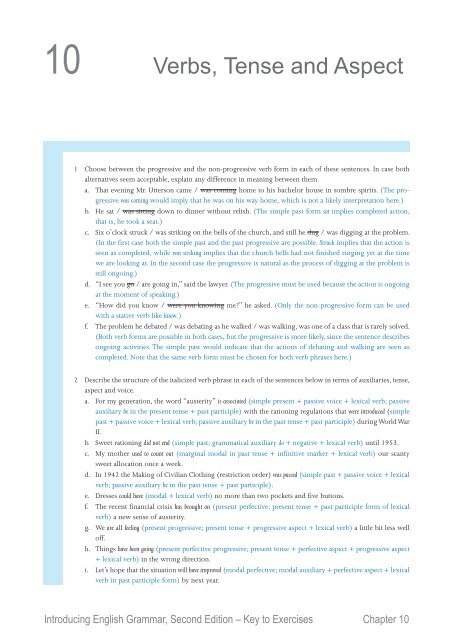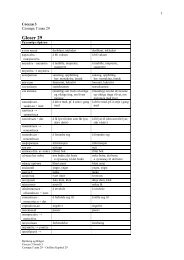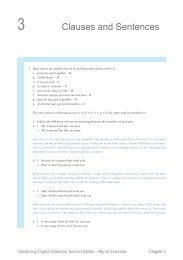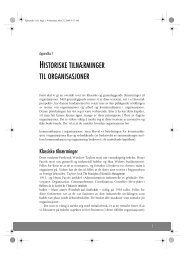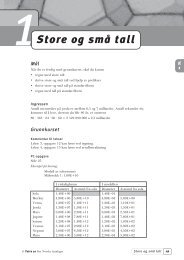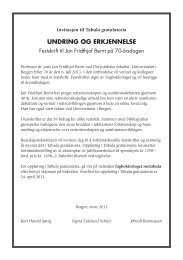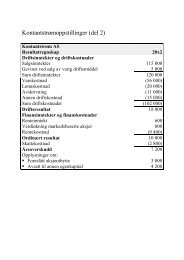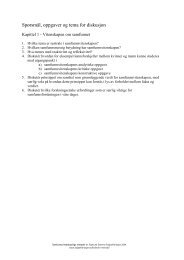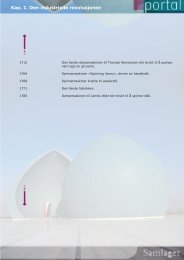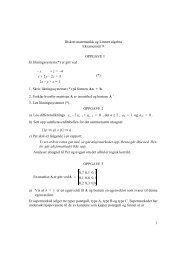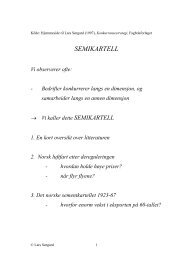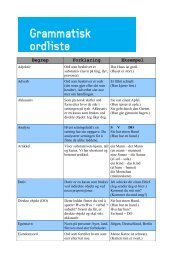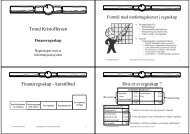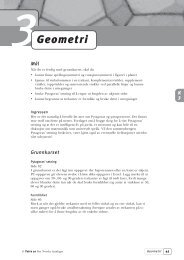10 Verbs, Tense and Aspect - Fagbokforlaget
10 Verbs, Tense and Aspect - Fagbokforlaget
10 Verbs, Tense and Aspect - Fagbokforlaget
Create successful ePaper yourself
Turn your PDF publications into a flip-book with our unique Google optimized e-Paper software.
<strong>10</strong> <strong>Verbs</strong>, <strong>Tense</strong> <strong>and</strong> <strong>Aspect</strong><br />
1 Choose between the progressive <strong>and</strong> the non-progressive verb form in each of these sentences. In case both<br />
alternatives seem acceptable, explain any difference in meaning between them.<br />
a. That evening Mr. Utterson came / was coming home to his bachelor house in sombre spirits. (The progressive<br />
was coming would imply that he was on his way home, which is not a likely interpretation here.)<br />
b. He sat / was sitting down to dinner without relish. (The simple past form sat implies completed action,<br />
that is, he took a seat.)<br />
c. Six o’clock struck / was striking on the bells of the church, <strong>and</strong> still he dug / was digging at the problem.<br />
(In the first case both the simple past <strong>and</strong> the past progressive are possible. Struck implies that the action is<br />
seen as completed, while was striking implies that the church bells had not finished ringing yet at the time<br />
we are looking at. In the second case the progressive is natural as the process of digging at the problem is<br />
still ongoing.)<br />
d. “I see you go / are going in,” said the lawyer. (The progressive must be used because the action is ongoing<br />
at the moment of speaking.)<br />
e. “How did you know / were you knowing me?” he asked. (Only the non-progressive form can be used<br />
with a stative verb like know.)<br />
f. The problem he debated / was debating as he walked / was walking, was one of a class that is rarely solved.<br />
(Both verb forms are possible in both cases, but the progressive is more likely, since the sentence describes<br />
ongoing activities. The simple past would indicate that the actions of debating <strong>and</strong> walking are seen as<br />
completed. Note that the same verb form must be chosen for both verb phrases here.)<br />
2 Describe the structure of the italicized verb phrase in each of the sentences below in terms of auxiliaries, tense,<br />
aspect <strong>and</strong> voice.<br />
a. For my generation, the word “austerity” is associated (simple present + passive voice + lexical verb; passive<br />
auxiliary be in the present tense + past participle) with the rationing regulations that were introduced (simple<br />
past + passive voice + lexical verb; passive auxiliary be in the past tense + past participle) during World War<br />
II.<br />
b. Sweet rationing did not end (simple past; grammatical auxiliary do + negative + lexical verb) until 1953.<br />
c. My mother used to count out (marginal modal in past tense + infinitive marker + lexical verb) our scanty<br />
sweet allocation once a week.<br />
d. In 1942 the Making of Civilian Clothing (restriction order) was passed (simple past + passive voice + lexical<br />
verb; passive auxiliary be in the past tense + past participle).<br />
e. Dresses could have (modal + lexical verb) no more than two pockets <strong>and</strong> five buttons.<br />
f. The recent financial crisis has brought on (present perfective; present tense + past participle form of lexical<br />
verb) a new sense of austerity.<br />
g. We are all feeling (present progressive; present tense + progressive aspect + lexical verb) a little bit less well<br />
off.<br />
h. Things have been going (present perfective progressive; present tense + perfective aspect + progressive aspect<br />
+ lexical verb) in the wrong direction.<br />
i. Let’s hope that the situation will have improved (modal perfective; modal auxiliary + perfective aspect + lexical<br />
verb in past participle form) by next year.<br />
Introducing English Grammar, Second Edition – Key to Exercises Chapter <strong>10</strong>
3 Explain the difference in form <strong>and</strong> meaning between the members of each pair.<br />
a. 1 She walks the dog every night.<br />
2 She is walking the dog tonight.<br />
Sentence 1 has the simple present tense <strong>and</strong> sentence 2 has the present progressive. In addition the time adverbials<br />
are different: in 1, every night describes how often the action takes place, while in 2, tonight refers to “this<br />
evening”. Similarly, the simple present tense is used to describe habitual activity, while the present progressive<br />
describes ongoing, incomplete activity. Sentence 1 thus means that it is her habit to walk the dog every day.<br />
Sentence 2 means that she is not at home at the moment because she is walking the dog.<br />
b. 1 Do you speak Chinese?<br />
2 Are you speaking Chinese?<br />
Sentence 1 is a question about the addressee’s ability to speak Chinese. Sentence 2 is a question about what<br />
language the addressee is speaking at the moment. The reason for the difference is that the simple present tense<br />
refers to permanent states <strong>and</strong> habitual actions, while the progressive refers to ongoing activity.<br />
c. 1 Mr Jones has been to New York.<br />
2 Mr Jones was in New York.<br />
Sentence 1 means that Mr Jones has visited New York at some point, <strong>and</strong> this is relevant at the moment of<br />
speaking. Sentence 2 means that Mr Jones was in New York at some specific time in the past. The meaning<br />
difference is due to the verb phrases: Sentence 1 uses the present perfective, which refers to a past event at<br />
some unspecified time, while sentence 2 has the simple past tense, which refers to an event at a specific (or<br />
specifiable) time.<br />
d. 1 I was going for a walk when the sun came out.<br />
2 I went for a walk when the sun came out.<br />
Sentence 1 contains a verb phrase with the past progressive (was going). This refers to incomplete action. So the<br />
person was just about to go out when the sun started shining. He or she may or may not have taken the walk<br />
in the end. In sentence 2 the simple past tense has been used (went). The combination of a simple past verb<br />
phrase in the main clause with a simple past verb phrase in the dependent clause is interpreted as two actions<br />
following each other, in this case: then sun came out <strong>and</strong> so I went for a walk.<br />
e. 1 Sue was starting up a business.<br />
2 Sue had started up a business.<br />
As in sentence d1, the past progressive in e1 contains a past progressive verb phrase which refers to an incomplete<br />
action. Sue was in the process of starting up a new business. The verb phase in e2 combines past tense<br />
with the perfective aspect (past perfective) <strong>and</strong> thus refers to an action that was completed in the past, before<br />
the time of the “main story”. So Sue had already started up a business, <strong>and</strong> maybe she was now ready to take<br />
on a new project.<br />
4 Read the following text <strong>and</strong> answer the questions below:<br />
In a village near Lyon in south-east France, a couple have become local celebrities by virtue of their adopted “child”.<br />
Digit, as she is known, has been living in the same room as Pierre <strong>and</strong> Elaine Thivillon for nearly 13 years. Their<br />
relationship began in 1999, when the young primate came into the care of the couple, who manage the zoo at Saint<br />
Martin la Plaine where she was born. Within three days of her birth, it was clear that Digit’s mother Pamela was refusing<br />
to feed her. The Thivillons took her into their care, bottle-feeding her during the day <strong>and</strong> returning her to her<br />
enclosure at night.<br />
Introducing English Grammar, Second Edition – Key to Exercises Chapter <strong>10</strong>
By 18 months old, the baby gorilla had begun to show a deep attachment to her foster parents. After an illness<br />
left her requiring 24-hour care, Pierre <strong>and</strong> Elaine took her into their bedroom at night, where she has slept ever<br />
since. For the first <strong>10</strong> years, she snuggled up between the couple, but now at 130kg she has to have a bed of her own.<br />
(From bbc.co.uk)<br />
a. Have become is in the present perfective form. The past tense form became would be possible if the sentence<br />
was taken out of its context. But since the following sentence has the present tense, the present perfective is<br />
a much better choice. The notion of present relevance associated with the present perfective gives the first<br />
two sentences of the text a sense of news value.<br />
b. Has been living consists of a grammatical auxiliary in the present tense, which marks the perfective aspect.<br />
Been is the past participle form of the progressive auxiliary be, which is followed by an –ing participle. The<br />
verb phrase can be characterized as present perfective progressive. The meaning of this verb form is that<br />
the action started in the past, but continues into the present. That is, Digit still lives with Pierre <strong>and</strong> Elaine.<br />
c. The text switches to the past tense to recount events that are further back in time.<br />
d. Since refuse denotes an action that cannot stretch out in time, the past progressive aspect (was refusing) implies<br />
that the event was repeated over a period of time. The simple past (refused) would indicate that it was a onetime<br />
event.<br />
e. The perfective aspect (present or past) would not have been appropriate in this context because snuggled<br />
refers to an activity that took place over a specific period of time in the past.<br />
f. There is a comparison between the past <strong>and</strong> the present. The shift to the present time reference is marked<br />
by the time adverb now, which makes the use of the present tense natural.<br />
5 Findings from the Corpus of Contemporary American English at http://corpus.byu.edu/:<br />
a. What occurs as the first ten hits of was being in the COCA corpus will vary (because the corpus keeps being<br />
added to), so you may not get the same hits as we did. However, many of our examples of was being are part<br />
of a passive construction (for instance was being done), indicating duration over time in the past. Sentences<br />
where being is the main verb (for instance he was being grumpy) indicate that the subject was behaving in a<br />
certain way (in this case being grumpy on purpose) over a limited period of time. That is, in contrast to he<br />
was grumpy, the progressive form of be refers to a situation which is not permanent.<br />
b. One corpus example of the framing effect of the progressive is the following: As they were leaving Shelly opened<br />
the door of her apartment <strong>and</strong> waved frantically at them... The leaving was in progress, <strong>and</strong> was interrupted by Shelly<br />
opening the door.<br />
c. We found one example of had left which was not a past perfective verb phrase, namely My mom unleashed a<br />
noise that held every bit of hell she had left in her... Here left is part of the phrase “to have something left”, meaning<br />
“to still have something that has not been used (yet)”. Two examples that illustrate how the past perfective<br />
refers to a time prior to another point of time in the past are the following: (i) But beyond the boxes the room was<br />
as he had left it. (ii) The Willie Company had left two weeks earlier,...<br />
d. In our hits, most examples of she works occur in sentences that contain an adverbial referring to “her workplace”,<br />
for example, She works in a hotel. Some sentences describe the way in which she works as a rule (the<br />
habitual simple present), for example, She works harder than me, where harder than me is a manner adverbial.<br />
Some of the examples of the present progressive, such as Presently, she is working on her 11th book..., refer to ongoing<br />
activity (rather than regular activity). Another example that suggests activity that is not habitual is<br />
She is working again, as an exhibits coordinator for an aviation association. (This is due to the adverbial again.) The present<br />
progressive can also suggest that someone’s current work situation is not permanent, as in She is working as a<br />
junior assistant for the Faculty of Philosophy Department for Contemporary Croatian literature.<br />
Introducing English Grammar, Second Edition – Key to Exercises Chapter <strong>10</strong>


